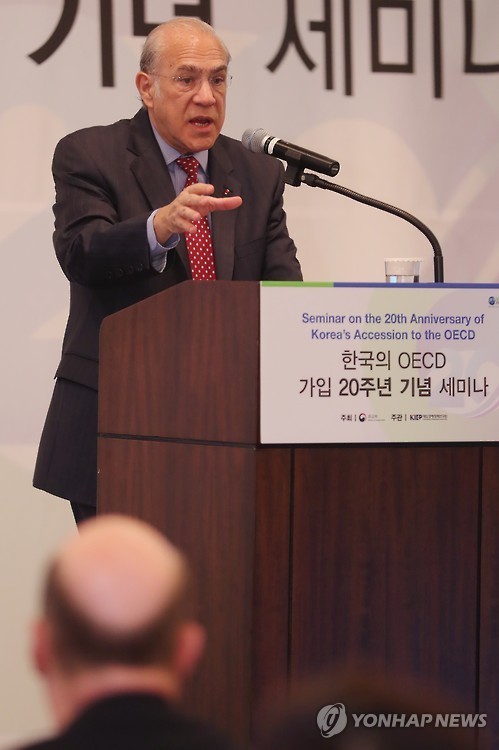OECD head cites population aging as most daunting challenge for Korea
By 임정요Published : Oct. 25, 2016 - 15:41
The most difficult long-term challenge confronting South Korea is population aging, which will likely weigh on the government by raising the overall spending on social welfare, the head of an international organization said Tuesday.
Angel Gurria, secretary-general of the Organization for Economic Cooperation and Development, asked Seoul to make efforts to better use older workers, saying that the wage peak system is a "positive" step to that end.

"Perhaps the most difficult is population aging," Gurria told a seminar organized here to celebrate the 20th anniversary of South Korea joining the OECD. "The transition from the fourth-youngest country in the OECD today to the third oldest by 2050 creates challenges, notably for public finances."
He projected that the aging population will increase the country's public social spending to 29 percent of gross domestic product by 2060 from the 10 percent tallied in 2013.
Related to this, Gurria underlined the need for South Korea to better utilize older workers, who have to retire at a relatively early age despite their extended life expectancy.
"Extending their careers requires increasing life-long learning to boost skills and shifting away from the seniority-based wage system," he said. "So the adoption of the wage peak system is a positive step."
He also cited "labor market dualism" as an area that needs to be tackled, saying that non-regular workers consist of a large portion of its workforce and their pay level is far lower than workers employed on a regular contract basis despite little difference in skills.
"A third of employees are non-regular workers, such as fixed-term, part-time and dispatched workers. In 2014, non-regular workers were paid 38 percent less than regular workers per hour, even though the skills of temporary workers match those of permanent prime-age workers," he said.
"This makes labor market dualism a driver of income inequality but also relative poverty, which is now the seventh highest in the OECD," he added.
To resolve the problem, he recommended such measures as relaxing employment protection for regular workers, increasing minimum wage and expanding social insurance coverage and training for non-regular workers.
He also singled out the country's relatively low employment of women compared with other members of the OECD, urging the government to make more efforts to address the gap and emphasizing that it would help expand its entire workforce.
"Policies should aim to raise the employment rate of women, which is 20 percentage points lower than that of men, the fourth-largest gap in the OECD. In fact, if the female participation rate for each age cohort were to match the rate for men by 2050, the labor force would be nearly one-fifth larger," he said. (Yonhap)
Angel Gurria, secretary-general of the Organization for Economic Cooperation and Development, asked Seoul to make efforts to better use older workers, saying that the wage peak system is a "positive" step to that end.

"Perhaps the most difficult is population aging," Gurria told a seminar organized here to celebrate the 20th anniversary of South Korea joining the OECD. "The transition from the fourth-youngest country in the OECD today to the third oldest by 2050 creates challenges, notably for public finances."
He projected that the aging population will increase the country's public social spending to 29 percent of gross domestic product by 2060 from the 10 percent tallied in 2013.
Related to this, Gurria underlined the need for South Korea to better utilize older workers, who have to retire at a relatively early age despite their extended life expectancy.
"Extending their careers requires increasing life-long learning to boost skills and shifting away from the seniority-based wage system," he said. "So the adoption of the wage peak system is a positive step."
He also cited "labor market dualism" as an area that needs to be tackled, saying that non-regular workers consist of a large portion of its workforce and their pay level is far lower than workers employed on a regular contract basis despite little difference in skills.
"A third of employees are non-regular workers, such as fixed-term, part-time and dispatched workers. In 2014, non-regular workers were paid 38 percent less than regular workers per hour, even though the skills of temporary workers match those of permanent prime-age workers," he said.
"This makes labor market dualism a driver of income inequality but also relative poverty, which is now the seventh highest in the OECD," he added.
To resolve the problem, he recommended such measures as relaxing employment protection for regular workers, increasing minimum wage and expanding social insurance coverage and training for non-regular workers.
He also singled out the country's relatively low employment of women compared with other members of the OECD, urging the government to make more efforts to address the gap and emphasizing that it would help expand its entire workforce.
"Policies should aim to raise the employment rate of women, which is 20 percentage points lower than that of men, the fourth-largest gap in the OECD. In fact, if the female participation rate for each age cohort were to match the rate for men by 2050, the labor force would be nearly one-fifth larger," he said. (Yonhap)








![[Hello India] Hyundai Motor vows to boost 'clean mobility' in India](http://res.heraldm.com/phpwas/restmb_idxmake.php?idx=644&simg=/content/image/2024/04/25/20240425050672_0.jpg&u=)









